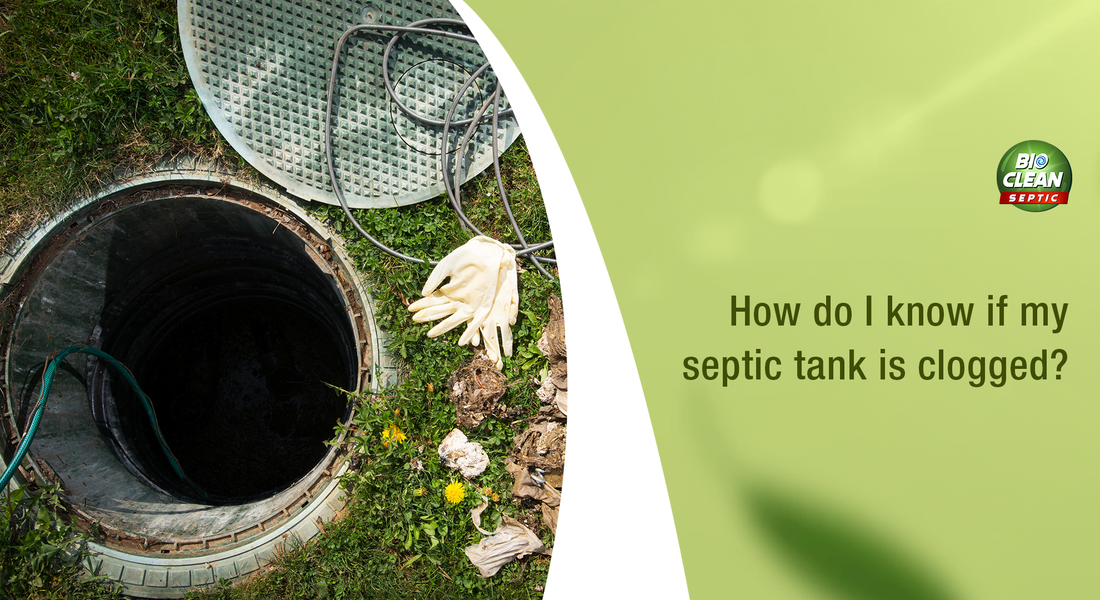Bioclean Septic is one of the best preventive solutions to keep your septic tank healthy. It contains microbes producing powerful enzymes that are capable of completely degrading fecal matter. They directly degrade organic buildup in drain pipes, gravel leach pits, and porous stone walls, thus preventing overflow and backflow issues and aiding septic tank treatment. When used regularly, it can reduce the dependency on frequent septic tank cleaning services by maintaining system efficiency naturally.
How Do I Know If My Septic Tank Is Clogged?

According to a survey report put forth by the National Statistical Office (NSO), around 96% of toilets in rural India are connected to a septic system, and about 47% of Indian households have septic tanks. However, many rural households still prefer open defecation to avoid the expenses of periodic pumping when septic systems overflow and emit foul odors—often due to the lack of access to reliable septic tank cleaning powder or services. To maintain sanitation in India, educating people about the proper use of septic tanks is crucial, as it benefits both individuals and the environment. When we talk about septic tanks, it is common to hear about safe decomposition supported by naturally occurring microbes.A well functioned septic tank should ideally ensure that pathogens are trapped within, not allowing them to be leached out. But many factors can affect the natural balance of these bacteria, which may compromise the tank's decomposition process. This could lead to the unhealthy discharge of wastewater in the area around the tank, posing a health hazard to life and groundwater contamination, which causes pollution.
If you’ve had a look at the five signs of a septic tank failure in our last blog, it will be easy to differentiate between a clogged drain and a clogged septic system.
Do you sometimes hear the sound of your toilet gurgling or the water level rising that requires you to clean the mess with the help of plunging? Clogs and backflow are caused when inorganic waste is trapped in the plumbing fixtures. However, the clog or overflow could also point to a problem inside your tank if you have a septic system.
Identify signs of a septic clog.
Before digging up a septic field or ordering a costly repair service, if your septic tank uses a filter, check for the following signs that would help in knowing if the septic filter is clogged and needs cleaning:
#1 Sluggish drainage
Inspect the sewer line between your home and the septic tank. Identify if there is water trickling through the line of the septic tank.
#2 Gurgling noises in sinks or toilets
When you flush the toilet, a weird gurgling noise indicates that the septic system is clogged.
#3 Drainfield is abnormally dried up
If the septic tank's septic filter is clogged, effluent is discharged slowly through it to the drain field, which relieves the drain field but is a sign of abnormality.
If the septic filter is very clogged, effluent may leave the septic tank underground at one of its service ports. Look for wet areas around it.
How do we get rid of septic tank clogs?
There are many life hacks and DIY methods to fix things around your home. When trying to unclog your septic system, some people pour boiling water or vinegar down the drains to break down blockages. However, as experts, we do not recommend relying on these home remedies, as they cannot guarantee effective results. For safe and reliable maintenance, using a proper septic tank cleaning powder like Bioclean ensures thorough waste breakdown and prevents clogging without harming the beneficial microbes in your system.
Occasionally you'll need a professional drain cleaner to pump the waste and eliminate clogs. However, they turn out to be expensive. There are chemical drain cleaners available in the market that aren't made explicitly for septic systems. These chemical cleaners clear the clogs while also killing beneficial bacteria in your tank and disrupting the bacterial balance.
When it comes to a drain cleaner or clog remover, the best thing to do is to purchase one that contains concentrated bacteria and enzymes that will kill the harmful bacteria and organic matter inside your tank while increasing the number of beneficial microbes. Your septic tank is an ecosystem that needs to be balanced to continue working correctly.
Our team at Organica Biotech has designed Bioclean Septic, which fulfills all the criteria. This formulation is intended for everyone, be it homeowners, housing societies, restaurants, resorts, commercial institutions, the corporate sector, and many others.
Other benefits of using Bioclean Septic are:
- Rapid Degradation
The microbes line up the septic tank and release enzymes that prevent the hardening of sludge and degrade organic matter that prevents sludge build-up, thereby reducing the need for pumping and saving on unnecessary costs.
- Eliminates Fats, Oils, and Grease
Accumulation of fats, oils, and grease in the drainage pipes is a major cause of concern because it leads to blockages in your septic tank. Our formulation contains fat-busting enzymes, which prevent FOG buildup in the system.
- Resistance to toxic chemicals, pH, and temperature fluctuations
Our tenacious consortium eliminates the septic tank's destructive/poisonous cleaning chemicals and ensures smooth functioning.
Septic systems are complicated, especially to the untrained eye. When there is a problem, it's not always obvious where it's originating from. Promptly diagnosing the issue and regularly maintaining your septic tank with the right solutions, is important to ensure it doesn't get worse or cause any problems for the people in your home!
Conclusion
Maintaining a healthy septic system is crucial for sanitation, safety, and long-term system efficiency. Using a reliable septic tank cleaning powder like Bioclean ensures rapid degradation of waste, prevents blockages, controls odors, and maintains the natural balance of beneficial microbes in your septic tank. Regular use of Bioclean reduces dependency on expensive septic tank cleaning services, prevents overflows, and safeguards groundwater. Homeowners, restaurants, commercial institutions, and housing societies can all benefit from this eco-friendly solution that promotes sustainable septic system management and prevents costly repairs.
FAQs
1. What is a septic tank cleaning powder?
A septic tank cleaning powder is a natural, microbial and enzyme-based formulation designed to break down organic waste, prevent blockages, and maintain the health of your septic system.
2. How does Bioclean septic tank cleaning powder work?
Bioclean septic tank cleaning powder contains beneficial bacteria and enzymes that degrade fecal matter, fats, oils, grease, and other organic buildup, keeping your septic tank efficient and odor-free.
3. How often should I use septic tank cleaning powder?
For optimal performance, apply septic tank cleaning powder once a month. Regular usage reduces sludge buildup, prevents clogs, and decreases the need for frequent pumping.
4. Is septic tank cleaning powder safe for the environment?
Yes. Bioclean septic tank cleaning powder is biodegradable, non-toxic, and eco-friendly. It protects groundwater, maintains microbial balance, and avoids chemical contamination.
5. Can septic tank cleaning powder prevent septic overflows and backflows?
Absolutely. Consistent use of septic tank cleaning powder helps prevent overflow, backflow, and foul odors by maintaining the natural microbial ecosystem inside your septic tank.



